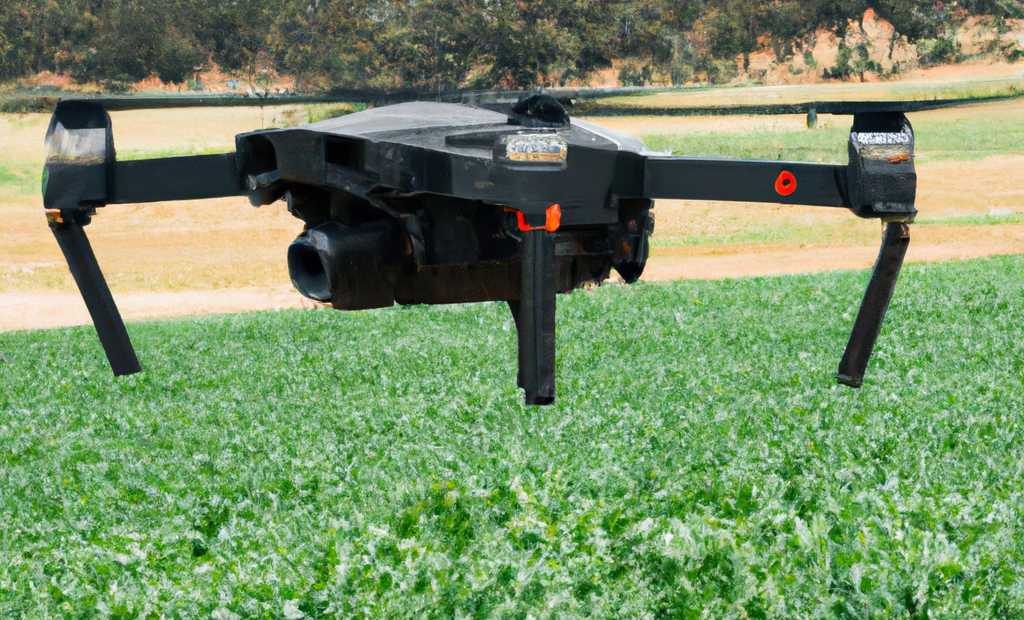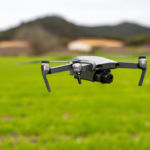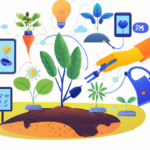The section highlights the crucial role of technology and biofertilizers in early detection and control of plant diseases in organic farming. These advances enable rapid intervention, reduce dependence on chemical fertilizers and promote soil health. The combination of technology and biofertilizers is redefining disease prevention in agriculture, enabling more profitable and sustainable production with minimal environmental impact.
In the current era, the integration of technology into various spheres of life has proven to be an invaluable tool. One such sphere is organic farming, where technology has played a crucial role in disease monitoring, improving both the efficiency and effectiveness of disease detection and management. This article explores in depth the role of technology in disease monitoring, focusing on its impact on organic farming and agricultural products. In particular, we examine the innovative relationship between biofertilizers and technology in disease detection, and the role of fertilizers in this domain. In the end, we hope to provide a comprehensive view of how technology and fertilizers can work together to improve the health and yield of our crops.
- 1. "Application of Technology in Disease Monitoring and its Impact on Organic Farming"
- 2. "Technology Integration for Disease Tracking: How Does It Impact Agricultural Products?"
- 3. "Biofertilizers and Technology in Disease Detection: An Innovative Relationship"
- 4. "The Role of Fertilizers in Technology Integration for Disease Monitoring"
1. "Application of Technology in Disease Monitoring and its Impact on Organic Farming"
The application of technology in disease monitoring has not only revolutionized the human health sector but has also had a major impact on organic farming. With the help of advanced technologies, farmers can detect and control plant diseases more efficiently, which contributes to maintaining and improving the quality of food produced. This is especially crucial in organic farming, where the use of chemical fertilizers is restricted. Instead, farmers turn to organic farming products such as biofertilizers to nourish their crops. Technology facilitates early detection of pathogens in fields, allowing for quick intervention to prevent the spread of diseases. Consequently, the dependence on fertilizers is reduced and soil health is promoted, which is beneficial for both farmers and the environment.
2. "Technology Integration for Disease Tracking: How Does It Impact Agricultural Products?"
The integration of disease monitoring technology is revolutionizing the agricultural products sector. This innovation allows farmers to detect and treat diseases at early stages, which can result in healthier and more productive crops. For example, fertilizer use can be optimized using disease monitoring technologies, ensuring that nutrients are applied in the most efficient and sustainable way possible. Furthermore, organic farming benefits greatly from these technologies, as farmers can use biofertilizers more effectively by having a better understanding of the needs of their crops. In short, the integration of technology in disease monitoring is transforming the way agricultural products are produced and used, with a positive impact on both the profitability and sustainability of agriculture.
3. "Biofertilizers and Technology in Disease Detection: An Innovative Relationship"
Today, biofertilizers have become an essential component in organic farming, providing vital nutrients for plants and strengthening their resistance against various diseases. The integration of technology in this context has enabled early and efficient detection of diseases, thereby maximizing crop productivity and sustainability. Agricultural products such as high-tech sensors can monitor plant conditions in real time and detect any signs of disease, allowing early interventions to prevent large-scale outbreaks. In this way, the intersection of biofertilizers and technology is establishing new frontiers in disease control and prevention in the agricultural sector.
4. "The Role of Fertilizers in Technology Integration for Disease Monitoring"
The role of fertilizers, particularly biofertilizers, in integrating technology for disease monitoring is essential and multifaceted. Organic farming greatly benefits from the use of biofertilizers and other agricultural products, not only to improve crop health and yield, but also to aid in the detection and control of diseases. Technological advances now allow for real-time monitoring of the efficacy of these fertilizers and their impact on plant health. Furthermore, technology enables early detection of signs of disease in crops, allowing for timely interventions to prevent large-scale outbreaks. These advances represent an integral part of modern sustainable agriculture, improving productivity while minimizing environmental impact.
The integration of technology in disease monitoring has proven to be a fundamental pillar in today's organic farming. The use of this technology not only improves the efficiency of disease monitoring, but also has a significant impact on the quality of agricultural products. Advances in this field have allowed the development of innovative biofertilizers that can detect and combat diseases, contributing to more sustainable and healthier agriculture. As we continue to explore and understand the potential of fertilizers in disease detection and prevention, it becomes increasingly evident that the fusion of technology and agriculture is essential for the future of safe and sustainable food. In short, the integration of technology in disease monitoring is a promising and necessary path to ensure the prosperity of organic farming and the quality of the agricultural products we consume.


